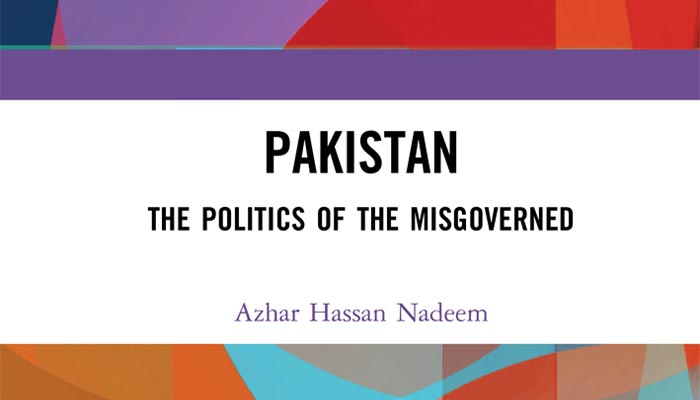Pakistani cop's book on 'Politics of the Misgoverned' shows a way forward for governance
'Pakistan: The Politics of the Misgoverned' makes for a wonderful read not only for history students but scholars and policymakers as well
April 05, 2021

ISLAMABAD: A former Pakistani cop believes that the country "requires a complete overhaul of its governance structure and methodology", as well as fortification of its institutions, to properly and inclusively develop its political economy.
Former inspector-general of police (IGP) Syed Azhar Hassan Nadeem in his latest book, Pakistan: The Politics of the Misgoverned, uses his life-long experience of working as a cop to highlight the country's challenges and give solutions to some of the key governance issues.
Nadeem — who retired in 2008 and later served as a member in Punjab Public Service Commission (PPSC) from 2008 to 2011 — has extensively used his exposure and the lessons he learnt, in this book, which is divided into 10 comprehensive chapters.
Nadeem attempts to give a way forward to the country for coming out of the ongoing governance-related crises, including those pertaining to the rule of law, criminal justice system, local government, civil society, terrorism, and socioeconomic scenario, as well as the role of parties and the Pakistan Army in politics.
He argues that Pakistan’s political scenario "has been polluted by the existence of extractive institutions and the failure of the state to evolve an inclusive institutional setup" despite a higher number of people getting opportunities for upward mobility in the recent past.
Though he refrains from elaborating on the political parties' roles, he underscores some historic events that had certain key players. He also goes on to talk about the troubling civil-military ties — particularly the era between 2016 to 2019 — discussing the relations between the then-Nawaz Sharif-led PML-N government and former Pakistan Army chief retired General Raheel Sharif.
Nadeem, whereas criticises the role of military bureaucracy, also remains critical of the absence of merit-based promotions in political parties, which results in dynasties and an absence of debates on vital issues.
Continuing on the tangent, the author mentions that a lack of think-tanks in political parties prevents them from finding solutions to problems such as sustainable growth, social development, housing, health, and education.
The book also demands that Pakistan's religious-based identity needs to be done away with and the basis of the nation state should be common residence of the same geographical identity.
The author believes that Pakistan's founding father, Quaid-e-Azam Muhammad Ali Jinnah, did not have narrow minded vision but that he preferred equality and did not want any discrimination among the citizens.
A discriminatory application of law is one of the key reasons that the development policies remain futile in Pakistan, he argues, demanding an justice system based on equality.
Nadeem also talks about the missed opportunities in Pakistan's socioeconomic scenario, an in-depth discussion on the structural challenges, and a retired police officer's recommended way forward.
Towards the end, he demands a new social contract and reinvigorating the institutions, as well as a new national criminal justice policy.
Using a reference of the Constitution of 1956 wherein protection was guaranteed to civil officers but revoked later in 1973, he argues that bureaucrats be given constitutional protection.
The former cop has dedicated one of the chapters of his 173-page book to the local government system in Pakistan, giving a historic overview of the situation and observing that the military rulers used the same system to attain legitimacy.
Nadeem smartly included a "conclusion" in each chapter in which he discusses the main points of his thesis on the said issue.
Pakistan: The Politics of the Misgoverned makes for a wonderful read not only for the students of history but for the scholars and policymakers who wish to understand Pakistan's challenges and aim to resolve them.











